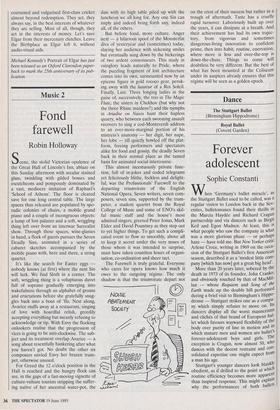Music 2
Fond farewell
Robin Holloway
Scene, the stolid Victorian opulence of the Great Hall of Lincoln's Inn, ablaze on this Sunday afternoon with secular stained glass, twinkling with gilded bosses and escutcheons and pompously dominated by a vast, mediocre imitation of Raphael's `School of Athens'. The floor is cleared save for one long central table. The large spaces thus released are populated by spo- radic colonies of chairs, a mobile grand piano and a couple of incongruous objects: a lump of lost palazzo and a soft, wriggling thing left over from an interwar Surrealist show. Through these spaces, wine-glasses in hand, a flock of guests pursues the Seven Deadly Sins, animated in a series of cabaret sketches accompanied by the mobile piano with, here and there, a string quartet.
It's like the search for Easter eggs nobody knows (at first) where the next Sin will lurk. We find Sloth in a corner. The soft, wriggling thing is a voluptuous duvet full of soprano gradually emerging into wakefulness through an alphabet of groans and eructations before she gratefully snug- gles back into a bout of 'flu. Next along, Avarice stuffs away at a restaurant, singing of love with hoardful relish, greedily accepting everything but meanly refusing to acknowledge or tip. With Envy the flocking onlookers realise that the progression of vices is going to be anti-clockwise. The sub- ject and its treatment overlap Avarice — a song about resentfully hankering after what you haven't got. No doubt the other six composers envied Envy her brazen trum- pet, otherwise unused.
For Greed the 12 o'clock position in the Hall is reached and the hungry flock can see, in the gaps of a fast-moving vignette of culture-vulture tourists stripping the suffer- ing native of her ancestral water-pot, the dais with its high table piled up with the luncheon we all long for. Any one Sin can imply and indeed bring forth any, indeed all, of the others.
But before food, more culture. Anger next — a hilarious spoof of the Monsterfat diva of yesteryear and (sometimes) today, slaying her audience with sickening smiles but eventually sung down by the bickerings of two ardent connoisseurs. This study in vainglory leads naturally to Pride, where the puzzling fragment of lost architecture comes into its own, surmounted now by an epicene figure in gold rococo gear, peruk- ing away with the hauteur of a Roi Soleil. Finally, Lust. Three longing ladies in the guise of, successively, the trio in The Magic Flute, the sisters in Chekhov (but why not the three Rhine maidens?) and the nymphs in Ariadne on Naxos hunt their hapless quarry, who between each swooning assault recovers to sing a cod-Monteverdi address to an ever-more-marginal portion of his mistress's anatomy — her digit, her nape, her lobe — till quietly howled off the plat- form, freeing performers and spectators alike for food and gossip, the deadly Seven back in their normal place as the tamed basis for animated social intercourse.
This almost incestuously private func- tion, full of in-jokes and coded telegrams yet felicitously blithe, feckless and delight- ful, was the Professionals' Farewell to the departing triumvirate of the English National Opera. Seven writers, seven com- posers, seven sins, supported by the trum- peter, a student quartet from the Royal College of Music and some of ENO's skil- ful music staff and the house's most admired singers, greeted Peter Jonas, Mark Elder and David Pountney as they step out to yet higher things. To get such a compli- cated event to flow so smoothly, above all to keep it secret under the very noses of those whom it was intended to surprise, must have taken countless hours of organi- sation, co-ordination and sheer tact.
The Farewell is truly grateful. Everyone who cares for opera knows how much it owes to the outgoing regime. The only shadow is that the triumvirate depart not on the crest of their success but rather in a trough of aftermath. Taste has a cruelly rapid turnover. Laboriously built up over the years, it can dissipate at a breath. And their achievement has had its own trajec- tory, from vigorous and sometimes dangerous-living innovation to confident prime, then into habit, routine, enervation, where more is less and over-the-top is down-the-chute. Things to come will doubtless be very different. But the best of what has been mounted at the Coliseum under its auspices already ensures that this regime will be seen as a golden epoch.


















































 Previous page
Previous page